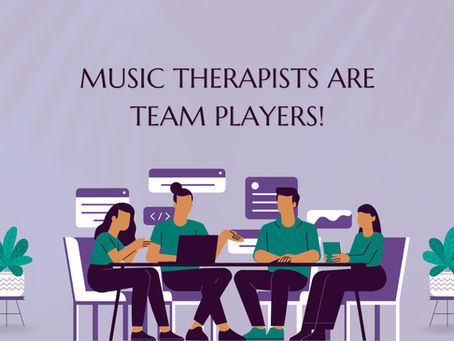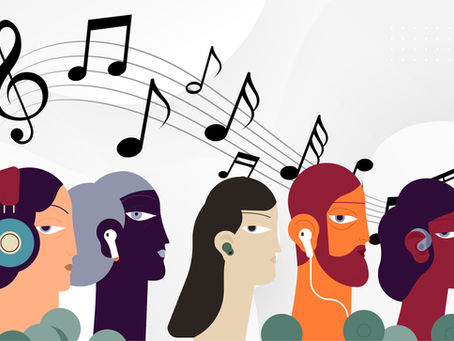top of page
Search


4 Festive Music Therapy Interventions
The first official day of winter is upon us, and if you’re reading from anywhere in the Midwest, you’ll know that it has felt like winter for a long time! For music therapists, this time of year is such a fun opportunity to tap into our repertoire of winter and holiday tunes. If you are looking for new tools for your winter music therapy toolbox, here are 4 winter and Christmas themed interventions you can try! 12 Days of Christmas - Instrument Play Remix Goals Addressed: In

Lauren Schaff, MT-BC
Dec 19, 20254 min read


Some useful tunes, and the power of TENTHS!
Here are some tunes that have been useful to me in sessions, maybe you know them already but if not, these are good’uns! “I Don’t Want to Live on the Moon” written in 1978 by Jeff Moss and performed on Sesame Street by Ernie (Jim Henson). This song was re-introduced to me by Erin Frees, MT-BC when I was interning at Children’s Minnesota. She utilized it as a lullaby to help encourage rest. I say re-introduced because I remember playing it once or twice at random gigs with lo

Andy Schuster, MT-BC
Nov 24, 20254 min read


Attitude of Gratitude?
Music therapists often incorporate music-based interventions that reflect the current seasons. As the calendar turns to November, I often find myself struggling to integrate the concept of gratitude into sessions. On one hand, practicing gratitude has been shown to positively impact health and wellbeing by improving sleep, mood, and immunity; and has also been shown to decrease depression, anxiety and chronic pain (American Heart Association, 2023). On the other hand, clients

Kristi McNellis, MT-BC
Nov 17, 20252 min read


Music Therapists as Team Players on a Multidisciplinary Team
One thing that I have always loved about being a music therapist is the way I get to blend many of my skills together. I am a musician. I blend both technique and precision with self-expression and creativity. I am flexible, adaptable and often play in collaboration with others (hello orchestra people!) I am a therapist. I care for people, and can understand their needs through assessment. I can listen, engage, guide and support. I am an allied health professional. I work i

Carolyn Beck, MT-BC
Nov 10, 20252 min read


Adaptive Instruments pt. 2
In music therapy, accessibility is essential. Every client should have the opportunity to participate in music-making, regardless of physical, sensory, or cognitive ability. Adaptive instruments make that possible. These tools and modifications expand how clients can engage in musical experiences, supporting clinical goals through active participation. What Are Adaptive Instruments? Adaptive instruments are musical tools designed or modified to meet individual needs. They all

McKenna Selissen, MT-BC
Nov 3, 20252 min read


Intervention Idea: Visually-Prompted Songwriting
As Halloween rolls around this week, I thought I would give a little rundown of my favorite songwriting intervention to use in group settings with older adults near holidays! Display an image on a projector screen/TV with seasonal relevance , preferably involving an action and a relational component (a family, a couple, a group of friends, etc.); all of these elements will make it easier for clients to create a story with their song and to recall their own memories. For exa

Emily Heck, MT-BC
Oct 27, 20253 min read


Using Primary Instruments in Music Therapy
As music therapists, we are trained on guitar, piano, voice, and percussion. But many music therapists spend years cultivating a personal relationship to music by learning a different instrument long before pursuing a career in the field. Yet, many MT-BCs don’t use their primary instrument in clinical settings. Music therapy interventions can be effectively facilitated on an instrument outside of those taught in music therapy curriculum. For instance, hearing a new sound ca

Abby Metcalf, MM, MT-BC
Oct 20, 20252 min read


Adaptive Instruments in Music Therapy
In our work as music therapists, we interact with individuals of all ages and abilities. It is important to consider the different ways...

Jess Neppl, MT-BC
Oct 13, 20252 min read


The Ice-Breaker Effect
Be honest. How many of you hear the word ‘ice-breaker’ and immediately feel panicked? You’re not alone. Ice-breakers can be anxiety...

Kayla Shafer, MA, MT-BC
Oct 6, 20252 min read


Music and Nature? Perspectives of Music Therapists
Have you ever considered integrating nature into your music therapy practice? A recent study published in The Arts in Psychotherapy found...

Kristi McNellis, MT-BC
Sep 29, 20252 min read


Tips for Facilitating Guided Relaxation
When people hear that I am a music therapist, they often jump to the conclusion that my job entails playing sedative, atmospheric music...

Emily Dobson, MT-BC
Sep 22, 20253 min read


The Neuroscience of Music: A Review of the Basics
As music therapists, we know that music engages the brain in powerful ways. Whether we are working toward emotional regulation, motor...

Katie Kottemann, MT-BC
Sep 15, 20253 min read


Do you believe in music? Pt 2
These thoughts are inspired by Kayla Shafer’s post from July, in which she argued that what determines the success of a music therapy session is less about the therapist’s choices than one might expect–that in fact, an important element is the client’s belief in music as a therapeutic medium. This idea had not occurred to me, but immediately felt true, and I’ve been thinking ever since about the nature of that belief: what does it mean to believe in the music, and what can t

Joseph Neidorf, MT-BC
Sep 8, 20253 min read


Strum it or Stream it?
Strum It or Stream It? Using Live vs Recorded Music in Music Therapy Every day, music therapists carefully decide how to use music with...

Lauren Schaff, MT-BC
Aug 29, 20254 min read


Music Therapy and Grief
Something that pertains to everyone in the world is something that is not often talked about. It is something that can or may affect us...

Michelle McConnell, MT-BC
Aug 18, 20252 min read


Music Therapy in the NICU
This past June, I had the privilege of completing my NICU Music Therapy training through the National Institute for Infant and Child...

Carolyn Beck, MT-BC
Aug 11, 20252 min read


Andy's Random Resources!
(for Musical and Music Therapy adjacent purposes) Hello to you, blog reader! Thank you for being here and taking some time to read. I...

Andy Schuster, MT-BC
Aug 4, 20256 min read


What it means to be an MT-BC
What is Music Therapy? According to the American Music Therapy Association (AMTA) Music Therapy is defined as “the clinical &...

Molly Vielhauer, MT-BC
Jul 28, 20252 min read


5 Ways to Prevent or Manage Burnout
In our work as music therapists, at times it can feel like we are constantly draining our mental and emotional reserves. This can...

Jennifer Blair, MMT, MT-BC
Jul 21, 20253 min read


Do you believe in music?
Every Monday evening during the fall semester, you will find me teaching Psychology of Music at the University of Minnesota to music...

Kayla Shafer, MA, MT-BC
Jul 14, 20252 min read
bottom of page
